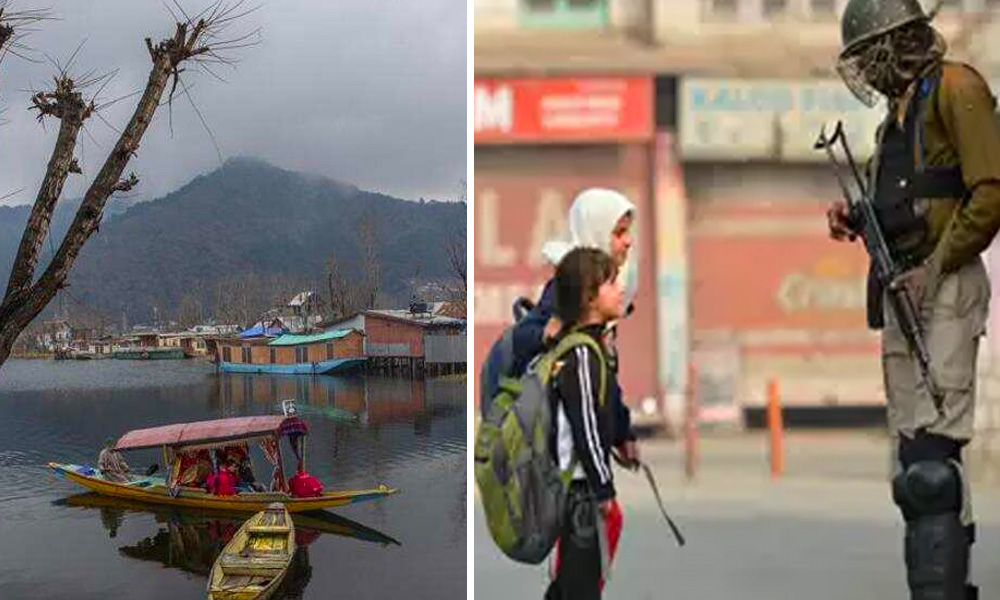
Image Credit: Hindustan Times
People Residing In J&K For 15 Yrs Now Eligible To Become Permanent Residents
India, 1 April 2020 2:33 PM GMT
Editor : Shweta Kothari
A broadcast turned digital journalist, Shweta Kothari heads the newsroom at The Logical Indian. She has previously worked with CNBC and NewsX as a news anchor and senior correspondent. Shweta holds a masters degree in journalism from the university of Sussex, UK and started her career with work placement with BBC in Scotland.
The fresh rule also allows domicile to those who have pursued their education in Jammu and Kashmir for seven years and have appeared for their Class 10 or 12 examinations in the UT.
Amending the definition of domicile for Jammu and Kashmir, the central government on Tuesday said that a person residing there for a minimum of 15 years will now be eligible to become a permanent resident of the Union Territory.
The fresh rule also allows domicile to those who have pursued their education in Jammu and Kashmir for seven years and have appeared for their Class 10 or 12 examinations in the UT.
The new rule was mentioned in the latest gazette notification, Section 3A of the Jammu and Kashmir Reorganisation Adaptation of State Laws Order, 2020, under the Jammu and Kashmir civil services decentralisation and recruitment Act.
Before scraping the Article 370 on August 5, the Jammu and Kashmir Assembly could constitutionally define a resident of the erstwhile state who were alone eligible to apply for jobs or posses immovable property.
The definition was expanded to include "children of those central government officials, all India services officers, officials of Public Sector Undertakings and autonomous body of central government, public sector banks, officials of statutory bodies, officials of central universities and recognised research institutes of central government who have served in Jammu and Kashmir for a total period of ten years or children on parents who fulfil any of the conditions in sections."
People who are recorded as a migrant by the Relief and Rehabilitation Commissioner (Migrants) in the Union Territory, will now also be included in the new definition.
Under the amendments made to the Act, the tehsildar will have the authority to issue the domicile certificate instead of a deputy commissioner or any officer specially notified by the state government.
The Centre had withdrawn the 29 state laws and amended additional 109 ever since Jammu and Kashmir's special status was revoked in 2019.
Section 5A clarifies that no individual shall be eligible for appointment to a post carrying a pay scale for not more than level 4 "unless he is a domicile of the Union Territory of Jammu and Kashmir".
Through the same order, the Centre has also repealed the the Jammu and Kashmir Civil Services Special Provisions Act.
As per the new rules, children of central government officials, all India services, public sector undertakings, public sector banks, statutory bodies, central universities and recognised research institutes of the central government who have served in J&K for 10 years will be eligible to apply for gazetted and non-gazetted government jobs in the UT.
The new rules have been criticised by opposition leaders who have pointed out that J&K residents are now only eligible for low-paying jobs.
National Conference chief Omar Abdullah, who was released recently after eight months in detention, said that it is an "insult heaped on injury" and fiercely questioned the timing of a "domicile" notification as India fights to contain a pandemic.
Talk about suspect timing. At a time when all our efforts & attention should be focused on the #COVID outbreak the government slips in a new domicile law for J&K. Insult is heaped on injury when we see the law offers none of the protections that had been promised.
— Omar Abdullah (@OmarAbdullah) April 1, 2020
"You can imagine how hollow the domicile law is from the fact even the new party, created with Delhi's blessings, whose leaders were lobbying in Delhi for this law, have been forced to criticise," he added.
The order has also been criticised by the People's Democratic Party (PDP), which claims that it would lead to "massive problems for residents of J&K".
The domicile law as it appears is not only trying to shake the boundaries of an already existing state, but it is also trying to give rise to massive problems for the residents of J&K
— J&K PDP (@jkpdp) April 1, 2020
Mehbooba Mufti, the party chief who is still under detention, also lashed out at the centre and called it an "manipulation of the law" that would further alienate people in UT.
Also Read: After Seven Months, Jammu & Kashmir Lifts Social Media Ban Till March 17
 All section
All section













